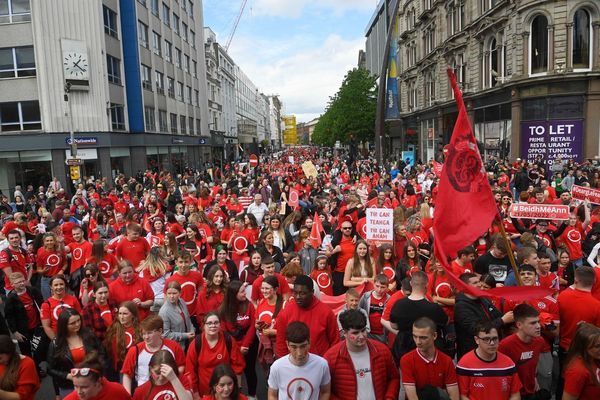Fearghus Ó hÍr, sixties civil rights activist, former councillor with People's Democracy in the 1980s and founding principal at Irish medium secondary school Coláiste Feirste rebutts unionist arguments against the use of the Irish language in the public square.
Leaders of Unionism need to answer serious questions regarding their opposition to the Irish language. They make false arguments to try to justify their campaign.
The Irish language is one of approximately 7,000 languages in the world. The United Nations Department of Economic and Social Affairs reports, “Optimistic estimates suggest that at least 50 percent of today’s spoken languages will be extinct or seriously endangered by the year 2100. More pessimistic, but also realistic estimates claim that 90-95 percent of spoken languages will become extinct or seriously endangered by the end of this century”.
The renowned linguist Noam Chomsky stated, “A language is not just words. It’s a culture, a tradition, a unification of a community, a whole history that creates what a community is. It’s all embodied in a language.”
The eradication of between 50 per cent and 90 per cent of spoken languages within the lifetime of young people alive today would be a disaster of immense proportions. The loss of millennia of human knowledge, experience, ideas, creativity, literature, art, music. The destruction of entire cultures. The record of entire human societies wiped out.
Faced with such a catastrophe, enlightened individuals, governments and institutions have developed programmes to protect and promote endangered languages.
DEARG LE FEARG: Raising the flag for Irish language rights at the top of Errigal 
The UNESCO 2021 Atlas of World Languages, designates the Irish language as "definitely endangered". This brings responsibilities for all of us on this island — not just for the ‘Irish speaking community’ or of those interested in the Irish language. It is incumbent on authorities in all parts of this island to protect the indigenous endangered Irish language.
EDUCATION VITAL
Fundamental to the protection of a language is ensuring that people can learn the language. The education system is vital in this regard. Immersion education, has proven particularly important in enabling students to achieve fluency in the language. Irish-medium education has played a central role in the revival of the Irish language.
Opportunities to speak the language at work and in social situations are important. Media, television, radio, newspapers, books and social media are necessary. It is essential that people can use and see the language in the public arena when dealing with governmental, legal, commercial and other institutions.
OPPOSITION
Amongst the false arguments used to oppose attempts to support the Irish language is that large sums of money are being ‘wasted’ on the Irish language, rather than on other priorities such as education, health or repairing potholes.
We are told that Stormont ‘wasted’ £190.6 million on the Irish language between 2010 to 2017. Of this, £190.6m, £153m - around 80 per cent - was spent on Irish-medium schools. So around 80 per cent was money from the Department of Education spent on education, teaching maths, geography, science, French, and indeed English language and English literature with the advantage of giving students a fluency in the Irish language. Had these pupils not been attending Irish-medium schools they would have been in other schools, with the money being spent on educating them there.
Other money supposedly ‘wasted’ on the Irish language is being spent on youth services, social services, arts and other activities with the money coming from sources responsible for financing those services with added value from the provision being in Irish.
People supporting the Irish language are accused of ‘politicising’ the language. Language was politicised by colonial powers invading countries, forcing people to speak the imperial language and stopping them speaking their own language.
With the formation of the Northern Ireland state, Unionist and British governments continued to suppress the Irish language. Political suppression of the Irish language continues. The ban on the use of Irish in the courts was only repealed in February 2025. The continued opposition from political Unionism is politicising the Irish language.
BILINGUAL SIGNAGE
Unionist spokespeople regularly oppose bilingual signage. Bilingual signage in the public realm is essential to protect endangered languages, normalising and increasing familiarity with the language. Including bilingual signage when planning public infrastructure ensures no extra cost. A budgeted plan is needed to replace and refurbish existing mono-lingual signage.
Previously Irish Street signage was banned by Unionist governments. The ban was removed but replaced with a very restrictive policy requiring two-thirds of households in the street to vote in favour. A more progressive system was introduced in Belfast in 2022 with a vote of 15 per cent in favour needed.
Now some argue that the system is undemocratic. They expressed no concern about a lack of democracy when Irish street signs were banned or when a two-thirds majority was required. The new-found concern for democracy looks like another excuse to oppose support for the Irish language.
Another argument is that bilingual signage on some streets is ‘marking territory’. Some say that the Irish language is so ‘alien’ to them that they would not live in a street with bilingual signage.
A simple solution is to put up bilingual signage on all streets. This will end any genuine concern of ‘marking territory’ and will end alienation by enabling everyone to become familiar with the language.
AN TEANGA BHEO: Glór na Móna activists pick up the Gaeilge prize at the 2024 Aisling Awards
'SENSE OF BRITISHNESS'
Some claim that the Irish language threatens their ‘sense of Britishness’. Many people who see themselves as British speak Irish or Welsh or Scots Gáidhlig. It is strange that people who proclaim their ‘Britishness’ loudest, have such a fragile ‘sense of Britishness’ that it is threatened by hearing or seeing the Irish language. Or is this another excuse to block support for the Irish language?
Another argument put forward is that there are many speakers of Mandarin and Polish and other languages here so signage should be erected in those languages. Mandarin and Polish are not endangered languages, nor are they indigenous to this island. they do not require to be protected and promoted here.
If people who speak Mandarin or other languages require assistance, signage or information in public places, it should be provided.
Unionist leaders should end their opposition to supporting the Irish language. They should celebrate the rich linguistic and cultural thread, part of the heritage of all who live here. Our thread in the great tapestry of world cultures and languages which enriches all our lives and which we must ensure, will continue to enrich the lives of future generations. This is a challenge which faces us all. Are the leaders of Unionism up to face the challenge? Ar aghaidh linn!





